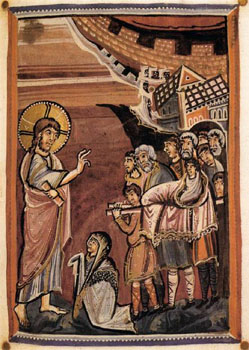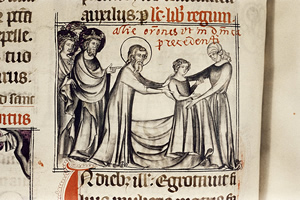For Sunday June 5, 2016
Lectionary Readings (Revised Common Lectionary, Year C)
1 Kings 17:8–16, (17–24) or 1 Kings 17:17–24
Psalm 146 or Psalm 30
Galatians 1:11–24
Luke 7:11–17
In her new book Strange Gods: A Secular History of Conversion (2016), the atheist journalist Susan Jacoby appeals to "earthly forces" to explain why people change religions — things like politics, economics, slavery, or, as in her own family history, interfaith marriages.
In Galatians, Paul experienced something like this purely human explanation for his encounter with the divine. Oddly enough, in his case, it came from fellow Christians who were dismissive of his claims of apostolic authority. After all, Paul had never even seen the earthly Jesus.
Paul vehemently rejects any notion that his message originated with any human source: "the gospel I preached is not something man made up." This is why he also wrote to the Thessalonians, "when you received the word of God from us, you accepted it not as the word of men, but as it actually is, the word of God."
Paul's apostolic confidence was rooted in the experience of his dramatic conversion. Like his gospel preaching, he says that his Damascus road experience could not be adequately explained by "earthly forces." And so he reminds the Galatians of his "previous way of life in Judaism" and subsequent radical conversion.
Part of me wishes that I could experience something unmistakably miraculous like Paul's conversion — the blinding light, the voice from heaven, and the confidence and conviction that flowed from that experience. But, alas, that's not where I live. I'm grateful that conversion is a life time experience, and that the miraculous is often found in the mundane.
I resonate more with the two other stories for this week — the two widows from Zarephath and Nain. They are examples of one of the remarkable aspects of the Biblical narratives, observes Owen King — that it often gives voice not just to the powerful and the famous, like the apostle Paul and King David, but also to the marginal and the obscure.
Indeed, says King, this is "something that is all too uncommon in literature, past and present." The vast majority of us, he notes, live unremarkable and ordinary lives, like the unnamed widows of Nain and Zarephath.
 |
|
Raising the son of the widow of Nain, German Hitda Codex, c. 1020.
|
The story about the widow of Nain occurs only in Luke, who places it right after a story about another obscure outsider, a Roman soldier. After healing the centurion's servant in Capernaum, Jesus and his disciples walked 25 miles southwest to the village of Nain.
Luke says that a "large crowd" accompanied Jesus and his disciples. When they entered the town gate, they met another "large crowd" that was leaving the village. It was a funeral procession. And so the two "large crowds" met — the followers of Jesus and the mourners of Nain.
The corpse was "the only son of his mother," which meant that this woman faced double jeopardy. She had been a widow, and now she was childless. As if her fragile life wasn't hard enough, she fell further down the economic scale of protection and provision. All she had to live for and to live by was gone.
When the two crowds met and Jesus encountered the widow, "his heart went out to her" in a spontaneous act of compassion. No one had asked him to do anything. No one had recognized him. But the sights and sounds were too much for Jesus. Moved to compassion, he told her, "Don't cry." He then touched the coffin, raised the man to life, and "gave him back to his mother."
The story of Elijah begins with a foreign widow from Zarephath, who at great personal sacrifice cared for him during a severe drought, and who in turn was cared for by Elijah.
This narrative of another nameless widow and a Hebrew prophet offering each other mutual care across nationalistic boundaries assumed such central importance in Israel's sacred story-telling that Jesus repeated it a thousand years later. The impact was the same — the listeners were outraged at the role reversals.
"I assure you that there were many widows in Israel in Elijah's time," said Jesus, "when the sky was shut for three and a half years and there was a severe famine throughout the land. Yet Elijah was not sent to any of them, but to a widow in Zarephath in the region of [enemy] Sidon… All the people in the synagogue were furious when they heard this." (Luke 4:25–28).
These two widows remind me that "the logic of divine Providence is not only ironic but frequently counter-intuitive." To take another example: the traditional and normal expectation in much of the Bible is that the divine blessing and the right of inheritance and succession belong to the first born. We call this "primogeniture."
But time and time again, God breaks the rules and blesses the younger and not the older, the least important and not the most privileged, the poor and not the rich.
André Aciman calls this "deuterogeniture" — the unexpected blessing of the second-placer. He observes how "the Old Testament teems with instances" of this "reverse" blessing that favors the second born — think of Abel, Isaac, Jacob, Rachel, Judah, Moses, David, and Solomon, all of whom were younger siblings.
In his poem "Miracle," Seamus Heaney takes this mundane and counter-intuitive perspective. He focuses not on the paralytic and the miraculous healing, but on his unnamed friends who showed up to help him and lowered him through the roof to put him in a place of healing.
Not the one who takes up his bed and walks
But the ones who have known him all along
And carry him in —Their shoulders numb, the ache and stoop deeplocked
In their backs, the stretcher handles
Slippery with sweat. And no let-upUntil he’s strapped on tight, made tiltable
And raised to the tiled roof, then lowered for healing.
Be mindful of them as they stand and waitFor the burn of the paid-out ropes to cool,
Their slight lightheadedness and incredulity
To pass, those ones who had known him all along.
While we wish for signs and wonders, for the parting of the seas, for the lightening bolt of a Damascus road conversion, we risk missing the miracle of the mundane, says Thomas Lynch. Like our friends and family who show up when we need them, "the ones who have known us all along."
 |
|
Elijah and the widow of Zarephath (Paris, 14th century).
|
Like the paralytic's friends in the gospel, or the widow who helped Elijah, these ordinary, obscure, and unsung people, says Lynch, "do their parts to get us where we need to go, within earshot and arm's reach of our healing, the earthbound, everyday miracle of forbearance and forgiveness, the help in dark times to light the way; the ones who show up when there is trouble to save us from our hobbled, heart-wrecked selves."
"Be mindful of them," says Heaney.
***
On the examples of Owen King, André Aciman, and Thomas Lynch, see Andrew Blauner, The Good Book: Writers Reflect on Favorite Bible Passages (New York: Simon and Schuster, 2015).
Image credits: (1) The Edge of the Enclosure and (2) Flickr.com.





